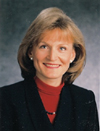 Dr.
Mary Wakefield is Director and Professor (Tenured) of the Center
for Rural Health at the University of North Dakota, School of Medicine
and Health Sciences, in Grand Forks, ND. She has held this position
since November 28, 2001. The Center for Rural Health engages in
a number of activities including policy analysis, research, and
educational initiatives. Priority policy issues include Medicare,
quality in health care, Native American health issues and emergency
medical services. Dr. Wakefield is also Adjunct Professor at the
University of North Dakota, College of Nursing. Dr.
Mary Wakefield is Director and Professor (Tenured) of the Center
for Rural Health at the University of North Dakota, School of Medicine
and Health Sciences, in Grand Forks, ND. She has held this position
since November 28, 2001. The Center for Rural Health engages in
a number of activities including policy analysis, research, and
educational initiatives. Priority policy issues include Medicare,
quality in health care, Native American health issues and emergency
medical services. Dr. Wakefield is also Adjunct Professor at the
University of North Dakota, College of Nursing.
Fom January, 1996 - December, 2001, Dr. Wakefield
served as Professor and Director of the Center for Health Policy
at George Mason University, Fairfax, VA. The Center for Health Policy
engages in a number of activities including policy analysis, research,
and educational initiatives. Priority policy issues include rural
health, Medicare, quality in health care, health workforce, and
international health policy.
From January 1993 - January 1996, Dr. Wakefield
was the Chief of Staff for United States Senator Kent Conrad (D-ND).
In this position she oversaw the legislative, administrative, political,
public, and press relations of the office in addition to managing
the Washington D.C. office as well as four state offices. From 1987
until 1992, Dr. Wakefield served as Legislative Assistant and Chief
of Staff to Senator Quentin Burdick (D-ND). Throughout her tenure
on Capitol Hill, Dr. Wakefield advised on a range of public health
policy issues, drafted legislative proposals, worked with interest
groups and other Senate offices. From 1987-1992, Dr. Wakefield co-chaired
the Senate Rural Health Caucus Staff Organization. In this capacity
she was directly involved with a wide range of rural health policy
issues including recruitment and retention of health care providers,
reimbursement, emergency services, telemedicine, among others. In
December 1992, she worked as a consultant for the Global Programme
on AIDS at the World Health Organization in Geneva, Switzerland.
|
 |
Pearls of Wisdom
Adapted from: Wakefield, M. (2002, Fourth Quarter). What Would
Florence Do? Reflections on Nursing Leadership. Honor Society
of Nursing. Sigma Theta Tau International.
 If we believe we can’t make a difference… We won’t.
If we believe we can’t make a difference… We won’t.
 Nurses
must engage with their elected officials at state and federal levels
to do what nurses do best... educate! Nurses
must engage with their elected officials at state and federal levels
to do what nurses do best... educate!
 Nurses
can use organizational structures to press for conversation with
elected officials. The challenges before us and the health care
industry are too great for nursing to solve on its own and too great
to be solved without Nursing’s voice. Nurses
can use organizational structures to press for conversation with
elected officials. The challenges before us and the health care
industry are too great for nursing to solve on its own and too great
to be solved without Nursing’s voice.
 Nurses
must engage in efforts within health care settings to improve systems
of care. All nurses have contributions to make at patient, micro
system and organizational levels. But... that is not enough. Nursing’s
voice is needed and belongs in the public policy arena. Nurses
must engage in efforts within health care settings to improve systems
of care. All nurses have contributions to make at patient, micro
system and organizational levels. But... that is not enough. Nursing’s
voice is needed and belongs in the public policy arena.
 Through professional organizations, nurses and most specifically
advanced practice nurses can cast a wide net of influence by working
with policy makers to inform them of both challenges and solutions
facing the profession and the population it serves.
Through professional organizations, nurses and most specifically
advanced practice nurses can cast a wide net of influence by working
with policy makers to inform them of both challenges and solutions
facing the profession and the population it serves.
|
 |
 Dr.
Mary Wakefield is Director and Professor (Tenured) of the Center
for Rural Health at the University of North Dakota, School of Medicine
and Health Sciences, in Grand Forks, ND. She has held this position
since November 28, 2001. The Center for Rural Health engages in
a number of activities including policy analysis, research, and
educational initiatives. Priority policy issues include Medicare,
quality in health care, Native American health issues and emergency
medical services. Dr. Wakefield is also Adjunct Professor at the
University of North Dakota, College of Nursing.
Dr.
Mary Wakefield is Director and Professor (Tenured) of the Center
for Rural Health at the University of North Dakota, School of Medicine
and Health Sciences, in Grand Forks, ND. She has held this position
since November 28, 2001. The Center for Rural Health engages in
a number of activities including policy analysis, research, and
educational initiatives. Priority policy issues include Medicare,
quality in health care, Native American health issues and emergency
medical services. Dr. Wakefield is also Adjunct Professor at the
University of North Dakota, College of Nursing.